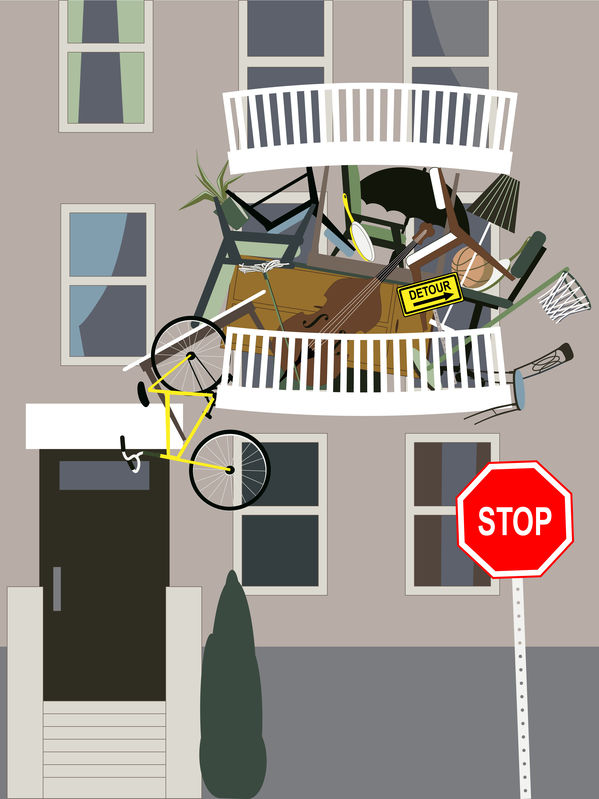So what do you think hoarding is about?
Hoarding is a very misunderstood condition. The word commonly conjures up giant piles of clutter, garbage, filth, pests, and at least 12 cats roaming around. People who hoard are thought of as lazy, dirty, elderly, poor, uneducated or even crazy. Some even think that hoarding is caused by trauma such as The Great Depression, war, traumatic loss or other painful events.
Most of what you just read are myths. I hope to help dispel some of these hoarding stereotypes and break down the misconceptions around this important mental health issue. But first, let’s look at a definition of Hoarding Disorder:
True Hoarding Disorder is a complex mental illness that used to be a subset of OCD. It now is a separately defined mental illness in the DSM-V.
- The acquisition of, and failure to discard, a large number of possessions that appear to be of useless or limited value.
- Living in spaces sufficiently cluttered so as to preclude activities for which those spaces were designed.
- Living with significant distress or impairment in functioning caused by the hoarding.
People with Hoarding Disorder usually need continual support to help them manage this mental health condition and ensure a safe living environment. It often requires a team consisting of a therapist, a certified professional organizer, cleaning company and supportive friends and family. There are usually three reasons why they choose to keep things:
- It’s useful
- It’s beautiful
- It’s sentimental
To complicate things, other conditions can mimic hoarding disorder: grief, depression, ADHD, etc. These are called hoarding behaviours. These hoarding situations tend to be more temporary because many of these conditions can be improved with therapy, medications or other medical treatments. People with hoarding behaviours can almost always be helped and can get back to living in what was their normal environment.
Animal hoarding and hoards made up of purely garbage is a level on its own and I will leave that for another time. It deserves its own blog.
Labels are important. Using the word Hoarder can be hurtful for the person and can further stigmatize them. Refer to them as a person first! Try saying ‘person wth Hoarding Disorder’ or ‘person with hoarding behaviours’. Also, don’t throw around the term casually. Referring to yourself as a hoarder while joking about the number of shoes you have belittles people who are truly struggling with it.
MYTH #1
Hoarders are lazy.
TRUTH: This illness has nothing to do with laziness. A person with Hoarding Disorder has extreme difficulty in parting with their possessions and is overwhelmed at the thought of it – even terrified. Even the most innocuous item like a broken vase is still valued because it might look beautiful when the sun hits it. Or perhaps, there is a moldy old suitcase sitting in the basement and the person can’t let go because it used to belong to their beloved grandfather. I can give you thousands of examples like this. The reasons are as unique as the individuals.
MYTH #2
Hoarders are dirty.
TRUTH: I have worked with Hoarding Disorder clients whose homes are fulled with brand new things. There are no bugs, rodents or biohazards. Squalor is not always present in a hoarded home, although due to neglect, homes tend to become quite dusty and dirty and are in general disrepair.
MYTH #3
Hoarders are always older.
TRUTH: Hoarding Disorder actually starts in childhood around the age of 12 but it is usually contained due to parents or siblings being in the house. Once that person is out on their own and life begins to happen, then the disorder can really start to manifest itself. Stress, trauma and loss can magnify the problem and the problem becomes bigger. Hoarding Disorder does tend to get worse as the person ages though due to other factors such as mobility issues, poor vision and cognitive impairment.
MYTH #4
Hoarders tend to be low-income.
TRUTH: Nope! Hoarding Disorder does not discriminate. It can affect people in any socio-economic level. It has very little to do with how much money the person has. I have seen hoarded homes in all kinds of homes, from wealthy neighbourhoods to social housing. It can happen in apartments and condos, mansions, trailers/campers, cottages and even vehicles.
MYTH #5
Hoarders are uncommon.
TRUTH: About 2-5% of the population is thought to be struggling with Hoarding Disorder. And with our aging population, that number is growing (see Myth #3). Think about a high-rise building with 300 residents…that means there could be 6-15 people in that building with a serious hoard in their apartment!
MYTH #6
Hoarders are uneducated.
TRUTH: People with Hoarding Disorder are often the smartest people in the room. They often know a lot about a many things! Some have multiple university degrees and speak several languages. They work and appear to live normal lives to the outside world yet their home tells a very different story. People with Hoarding Disorder tend to be very good at keeping people out. If friends or family want to come over, the person with the hoard usually goes to them rather than have them over to their hoarded home.
MYTH #7
Hoarders are crazy.
TRUTH: Just because someone has Hoarding Disorder, that doesn’t mean they are crazy. Many hold down long-time jobs, do volunteer work and are active members of their community. Sometimes there may be other mental illnesses complicating the situation (co-morbid conditions), but we can probably say that about a lot of people we know. Past sexual abuse, PTSD, ADHD or physical limitations can definitely exacerbate the situation and make helping the person with Hoarding Disorder a more complex case.
If you are a loved one is struggling with Hoarding Disorder or hoarding behaviours, then reach out to me. I can try to find an organizer in your area who can help. I am connected to qualified professional organizers all over the world through my network of professional associations such as:
Professional Organizers in Canada
Institute for Challenging Disorganization
National Association of Productivity and Organizing Professionals
If you are interested in learning more about people with Hoarding Disorder, then tune in to Hoarders Canada on the Makeful channel, premiering on Saturday, March 4 at 8:00 pm EST. You might recognize me there in a few episodes. 😀

